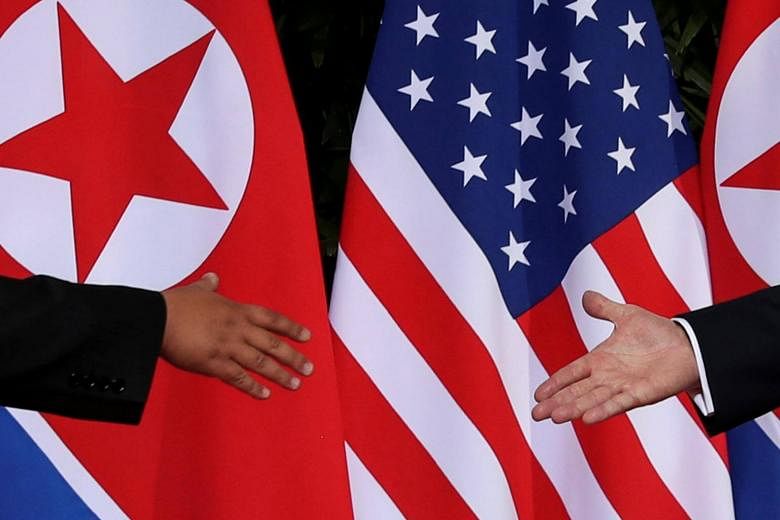US Secretary of State Mike Pompeo declared that the three North-east Asian countries of China, Japan and South Korea support Washington's stand that North Korea should denuclearise completely before sanctions are lifted or economic relief is provided.
However, Chinese Foreign Minister Wang Yi did not answer a question on this directly at their press conference yesterday, but said instead that China stood ready to play a constructive role in the denuclearisation process.
Mr Pompeo said: "Each of those countries has... acknowledged that it is important that the sanctions regime that is in place today remains in place until such time that the denuclearisation is in fact complete."
He was in Beijing two days after US President Donald Trump and Chairman Kim Jong Un of North Korea's State Affairs Commission held historic talks in Singapore and signed a joint declaration in which Pyongyang vowed complete denuclearisation in return for security guarantees from Washington.
The two sides also agreed to establish new bilateral relations and build a "lasting and stable" peace regime on the Korean peninsula.
Mr Pompeo made clear earlier yesterday in Seoul that sanctions would be lifted only after complete denuclearisation by North Korea.
This contradicts a report by North Korea's news agency KCNA on Wednesday that Mr Trump had agreed to lift sanctions as bilateral relations improved and to "abide by the principle of step-by-step and simultaneous action in achieving peace, stability and denuclearisation of the Korean peninsula".
Mr Pompeo refuted the claims in no uncertain terms. Referring to the failures of past efforts to resolve the North Korea issue, he said: "They were providing economic and financial relief before the complete denuclearisation had taken place. That is not going to happen."
On this, the US may not find China on the same page.
Its Foreign Affairs Ministry at a regular press briefing on Tuesday said the United Nations Security Council resolutions on sanctions required that as North Korea complied with these resolutions, "it is necessary to adjust the sanction measures, including the suspension of relevant sanctions".
Professor Shi Yinhong of Renmin University said China might loosen sanctions or continue with them but give other forms of economic aid to North Korea. This is because China's participation in the denuclearisation process was dependent on North Korea's acquiescence, and it therefore could not afford to damage its ties further with Pyongyang.
In another indication of the challenges ahead in the denuclearisation process, Japan and South Korea have displayed anxiety over Mr Trump's remarks about suspending US-South Korea military drills and the possibility of withdrawing US troops from South Korea.
Japan's Foreign Minister Taro Kono, at a joint press conference in Seoul yesterday morning with Mr Pompeo and his South Korean counterpart Kang Kyung Wha, stressed that the US-South Korea military exercises, together with the Japan-US security alliance, "play an essential role" in North-east Asia's security.
He added: "We also understand that the US maintains its commitment to defend allies and that the Japan-US security commitment and US forces in Japan posture remain unchanged."
Ms Kang said the US-South Korea alliance "remains as robust as ever".
SEE TOP OF THE NEWS

